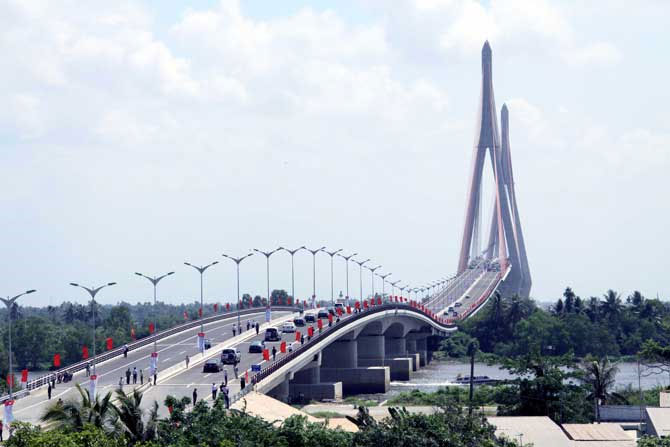Can Tho actively responds to climate change
In the framework of the project 'Building a comprehensive response plan for integrated flood risk management in Can Tho' , on February 8, the World Bank (WB) cooperated with Can Tho City People's Committee. Poetry held a workshop to propose proactive solutions to respond to climate change for Can Tho urban in the future.
At the workshop, many opinions of experts and specialized scientists proposed that Can Tho City People's Committee should attach environmental monitoring with focal points and key points for environmental protection activities. and sustainable development.
The specific task is to provide assessments of the environmental quality changes of each key area that has been monitored to serve the immediate requirements of the state management levels on environmental protection; timely warning of unusual developments or risks of environmental pollution and degradation; build a database of environmental quality for the storage, supply and exchange of information within the country.

The work of general planning comprehensively develops the urban vision until 2030 onwards (such as in agriculture, forestry, fisheries, urban industry and residential areas, residential clusters, transportation development planning Road, waterway, dyke overflows .) must take into account the climate change factor.
In the immediate future, the planning and socio-economic development projects of production, business, economic, scientific and technical, medical, cultural and social projects must continue to be evaluated. Environmental impact based on analysis, forecasted to be influenced by specific impacts of climate change in the future.
Can Tho city needs to strengthen the guidance of businesses, production facilities, trade villages . to invest, apply measures and technologies to reduce environmental pollution, reduce greenhouse gas emissions and encourage encourage investment in innovative, modern and environmentally friendly technologies.
The city focuses on propaganda methods, raising awareness for people about climate change, its impact on economy, society and environment.
Currently, it is necessary to help people stabilize their lives in the flood season; to soon complete population clusters and lines to overcome floods for poor people and landslides; building and replicating the model of "living with floods" with models of raising fish, shrimp, planting the flood season; funding support for localities to study and forecast meteorological and hydrological forecasting, improve environmental observation capacity, actively prevent natural disaster mitigation.
According to research and forecasts by scientists, by 2100, global climate change will make the natural environment, socio-economic region of the Mekong River Delta change, including Can city Poem.
If it does not actively respond, this locality will suffer from sea level rise that submerges more than 1 meter, leading to a loss of agricultural land. The flow of the Mekong River decreases from 2% - 24% in the dry season, increasing from 7% to 15% in the flood season, and droughts will appear more frequently, flood water will be higher, the flooding period will last than.
Drainage is also difficult. Decreasing water resources will seriously affect agricultural production, fisheries, transport, domestic water supply and people's health. Aquaculture models are at risk of bankruptcy. Productivity of crops and livestock, agricultural output will decline.
The lives of millions of residents will be disturbed by climate change. Only because of flood water in Can Tho, from 1996 to the present, there have been 123 deaths, 365,000 houses, 1,597 schools, 7,000km of roads, 104,000ha of rice being flooded, and significant damage.
- 'Vietnam needs to actively participate in combating climate change'
- This is how Dubai copes with climate change
- What is Climate Change?
- Marching for climate change around the world
- The terrifying change of the Earth due to climate change
- SimCLIM helps build climate change scenarios
- Climate change is happening faster than expected
- 4 shocking findings on climate change
- Too many animals and plants disappear due to climate change
- How is climate change damaging our health?
- The scary of climate change: The coldest animals cannot live anymore
- The tragedy of climate change
 Is the magnetic North Pole shift dangerous to humanity?
Is the magnetic North Pole shift dangerous to humanity? Washington legalizes the recycling of human bodies into fertilizer
Washington legalizes the recycling of human bodies into fertilizer Lightning stone - the mysterious guest
Lightning stone - the mysterious guest Stunned by the mysterious sunset, strange appearance
Stunned by the mysterious sunset, strange appearance